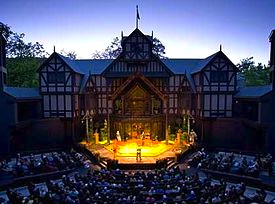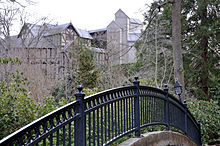Oregon Shakespeare Festival

Oregon Shakespeare Festival: 75 Years In The Making
This is an audio slideshow to accompany Dmae Roberts’ radio feature story that aired on NPR. Produced and narrated by Roberts, this five minute slideshow and radio story was created with photos taken by the Oregon Shakespeare Festival who own all copyright to all the photographs. Photo Credit: David Cooper, for more info, visit http://www.osfashland.org/.
 The Oregon Shakespeare Festival (OSF)
The Oregon Shakespeare Festival (OSF)
Is a regional repertory theatre in Ashland, Oregon, United States. The festival annually produces eleven plays on three stages during a season that lasts from February to October. Approximately half of the plays produced each year are by William Shakespeare.
Overview
 View of OSF buildings from a footbridge in Lithia Park
View of OSF buildings from a footbridge in Lithia Park
A typical season at OSF consists of three plays on the outdoor Elizabethan Stage/Allen Pavilion, three in the New Theatre, and five in the Angus Bowmer Theatre. OSF provides a broad range of educational programs for secondary and college students and theatre professionals while providing a wide range of classic and contemporary plays. While OSF has produced non-Shakespearean works since 1960, each season continues to include three to five Shakespeare plays. Since 1935, it has staged Shakespeare’s complete canonthree times, completing the first cycle in 1958 with a production of Troilus and Cressida and completing the second and third cycles through the works in 1978 and 1997. Since 2000, there has also been at least one new work each season from playwrights such as Octavio Solis and Robert Schenkkan.
In addition to the plays, a free outdoor “Green Show” precedes the evening plays from June through October. Originally, it offered Elizabethan music and dancers. From 1966 till 2007, it consisted of three shows in rotation inspired by the plays showing in the Elizabethan Theatre. Live music was supplied by the Terra Nova Consort and other guest musicians and modern dance was performed by Dance Kaleidoscope. In 2008, the Green Show was revamped. Performers may include a dance group from Mexico or India, clowns doing ballet on stilts, jugglers, or a fire show. OSF actors might showcase their musical talents. Improv, metal, or rock-n-roll variations on Shakespeare might be seen. Individual performers, groups, choirs, bands, and orchestras may present Afro-Cuban, baroque, blues, classical, contemporary, cowboy, funk, gospel, hip-hop, jazz, mariachi, marimba, poetry, marionette, renaissance, or salsa, sometimes combined in unexpected ways. Performers are drawn from throughout the Northwest and California.
The festival presents 750 to 800 performances of eleven plays in three theatres from February through early November each year, with a total average audience of 375,000 to 400,000 each season. The company consists of about 325 full-time personnel, including over 100 actors, 175 part-time support personnel, and approximately 700 volunteers.
The Oregon Shakespeare Festival is listed as a Major Festival in the book Shakespeare Festivals Around the World.
History
The festival traces its roots to the Chautauqua movement of the late 1800s. In 1893, the residents of Ashland built a facility that hosted its first performance on July 5. The building was expanded in 1905, and in its heyday, accommodated audiences of 1,500 for appearances by the likes of John Phillip Sousa and William Jennings Bryan during annual 10-day seasons.
In 1917, a new domed structure was built at the site, but it fell into disrepair after the Chautauqua movement died out in the 1920s. In 1935, the similarity of the remaining wall of the by then roofless Chautauqua building to Elizabethan theatres inspired Southern Oregon Normal School drama professor Angus L. Bowmer to propose using it to present plays by Shakespeare. Ashland city leaders granted him a sum “not to exceed $400” ($5,600 2005 est.) to present two plays as part of the city’s Independence Day celebration. However, they pressed Bowmer to add boxing matches to cover the expected deficit. Bowmer agreed, feeling such an event was in perfect keeping with the bawdiness of Elizabethan theatre, and the performances went forward. The Works Progress Administration helped construct a makeshift Elizabethan stage on the Chautauqua site, and confidently billed as the “First Annual Oregon Shakespearean Festival”, Bowmer presented Twelfth Night on July 2 and July 4, 1935, and The Merchant of Venice on July 3, with Bowmer directing and playing the lead roles in both plays. Reserved seats cost $1, with general admission of $.50 for adults and $.25 for children (approximately equivalent to $13.80, $6.90, and $3.45 2005 est.). Ironically, it was the profit from the plays that covered the losses the boxing matches incurred.
The festival has continued ever since, excepting 1941–1946, when Bowmer served in World War II, and quickly developed a reputation for quality productions. In 1939, OSF took a production of The Taming of the Shrew to the Golden Gate International Exposition in San Francisco that was nationally broadcast on radio. The lead actress, learning at the last minute the broadcast would be to a national audience, suffered a panic attack, was rushed to the hospital and the stand-in took over. The scripts didn’t arrive on the set until three minutes before air time. The Festival achieved widespread national recognition when, from 1951 to 1973, NBC broadcast abbreviated performances each year that were carried by more than 100 stations and, after 1954 on Armed Forces Radio and Radio Free Europe. The programs won favorable review from critics and for the first time people began to come from around the country. The programs led Life magazine to do a story on the Festival in 1957, bringing even more people to the plays. The NBC programs and the subsequent attention go a long way to explaining the mystery of how a tiny out-of-the-way timber town in the Northwest became a theatrical and tourist Mecca.
A second playhouse, the indoor Angus Bowmer Theatre, opened in 1970, enabling OSF to expand its season into the spring and fall; within a year, attendance tripled to 150,000. Bowmer retired in 1971, and leadership of the festival passed to Jerry Turner, a respected actor/director and later a translator of Henrik Ibsen and August Strindberg. Turner opened OSF’s third theatre, the Black Swan, in 1977, and festival attendance soon reached 300,000. In 1983 OSF won a Tony Award for achievement in regional theatre. Five years later, the Oregon Shakespearean Festival was renamed the Oregon Shakespeare Festival. At the invitation of the City of Portland, from 1988–1994, OSF established a resident theatre in the Portland Center for the Performing Arts, which later spun off to independence asPortland Center Stage. Those six seasons ran from November–April, and company members often worked in both cities.
Turner retired in 1991 and actor/director Henry Woronicz took control for five seasons. 1992 saw the opening of the Allen Pavilion, which encircled the open-air seating area within the walls of the Elizabethan Theatre.
When Woronicz left in 1996, OSF recruited Libby Appel from the highly respected Indiana Repertory Theatre, and a guest director at OSF from 1988 to 1991, as artistic director. In 1997, the OSF-commissioned The Magic Fire was presented at the John F. Kennedy Center and named by Time among the year’s best plays. In 2001, the ten millionth ticket to an OSF performance was sold. In 2002, the New Theatre replaced the Black Swan as the venue for small, experimental productions in a Black box theatre. In 2003, Timenamed OSF as the second best regional theatre in the United States (Chicago’s Goodman Theater was first).
Appel was succeeded in 2008 as Artistic Director by Bill Rauch. Rauch was the artistic director and co-founder of the Cornerstone Theater Company in Los Angeles and had directed plays previously at OSF. He is making direct connections between classic plays and contemporary concerns, exploring beyond the Western canon to incorporate Asian and African epics into the Festival, and reaching out to youth. Inspired by Shakespeare’s history plays, he has initiated a series of original plays focusing on American history. While continuing to work with established playwrights, he has commissioned works by new ones, and has initiated the Black Swan Lab to develop new works for the stage. His work resulted in his receiving the Margo Jones Award recognizing his impact on American theatre in 2009.
In 2007, OSF initiated a 10-year plan to create 37 original plays under the direction of Alison Carey, equaling the number of plays Shakespeare wrote, collectively known as American Revolutions: the United States History Cycle. The plays focus on moments of change in America’s past that help to establish a shared understanding of our national identity. Grants from The Andrew W. Mellon Foundation, the Collins Foundation, the Edgerton Foundation, the Harold and Mimi Steinberg Trust, and the Paul G. Allen Family Foundation support American Revolutions.
Partnerships with Arena Stage, Berkeley Rep, Guthrie Theatre, Playwrights Center, the Public Theatre, Seattle Rep, Steppenwolf Theatre Company, and the Yale Repertory Theatre ensure that the plays will reach beyond their original OSF audience.
The first play in the series, American Night: The Ballad of Juan José, was presented as part of the 2010 season and proved so popular that for the first time in OSF history, was expanded to include four extra performances. It was later produced at the Denver Theater Center, Center Theater Group, La Jolla Playhouse, and Yale Repertory Theatre. Ghost Light, the second in the series, was presented as part of the 2011 series. The OSF production then transferred to Berkeley Rep. The 2012 season includes All the Way and Party People, bringing to four the number of plays written and produced as part of the cycle at OSF. A fifth, an adaptation of E. L. Doctorow’s The March, premiered at Steppenwolf in 2012. The Liquid Plain will premier during the 2013 season.

